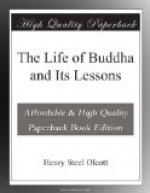What are the lessons to be derived from the life and teachings of this heroic prince of Kapilavastu? Lessons of gratitude and benevolence. Lessons of tolerance for the clashing opinions of men who live, move and have their being, think and aspire, only in the material world. The lesson of a common tie of brotherhood among all men. Lessons of manly self-reliance, of equanimity in breasting whatsoever of good or ill may happen. Lessons of the meanness of the rewards, the pettiness of the misfortunes of a shifting world of illusions. Lessons of the necessity for avoiding every species of evil thought and word, and for doing, speaking and thinking everything that is good, and for the bringing of the mind into subjection so that these may be accomplished without selfish motive or vanity. Lessons of self-purification and communion, by which the illusiveness of externals and the value of internals are understood.
Well might St. Hilaire burst into the panegyric that Buddha “is the perfect model of all the virtues he preaches ... his life has not a stain upon it”. Well might the sober critic Max Mueller pronounce his moral code “one of the most perfect which the world has ever known”. No wonder that in contemplating that gentle life Edwin Arnold should have found his personality “the highest, gentlest, holiest and most beneficent ... in the history of thought,” and been moved to write his splendid verses. It is twenty-five hundred years since humanity put forth such a flower: who knows when it did before?
Gautama Buddha, Sakya Muni, has ennobled the whole human race. His fame is our common inheritance. His Law is the law of Justice, providing for every good thought, word and deed its fair reward, for every evil one its proper punishment. His law is in harmony with the voices of Nature, and the evident equilibrium of the universe. It yields nothing to importunities or threats, can be neither coaxed nor bribed by offerings to abate or alter one jot or tittle of its inexorable course. Am I told that Buddhist laymen display vanity in their worship and ostentation in their almsgiving; that they are fostering sects as bitterly as Hindus? So much the worse for the laymen: there is the example of Buddha and his Law. Am I told that Buddhist priests are ignorant, idle fosterers of superstitions grafted on their religion by foreign kings? So much the worse for the priests: the life of their Divine Master shames them and shows their unworthiness to wear his yellow robe or carry his beggar’s bowl. There is the Law—immutable—menacing; it will find them out and punish.




